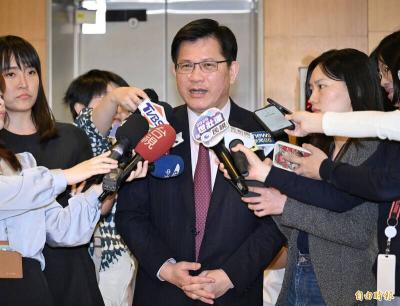Former Chinese Nationalist Party (KMT) spokesperson Yang Wei-chung (楊偉中) yesterday said that he was denied a Hong Kong visa because he has been appointed a member of the Committee of Illegal Party Asset Settlement.
He had applied for a visa to attend a forum, one to which that several Taiwanese politicians from across party lines had been invited.
“I just received a notice from the forum organizers saying that Beijing abruptly decided to deny me a visa to Hong Kong because I was appointed as a committee member to investigate the KMT,” Yang wrote on Facebook. “What happened to Hong Kong’s self-rule and a high degree of autonomy?”
He had been scheduled to give a speech today at the forum, and he had bought his plane tickets.
“The Chinese Communist Party [CCP] stands firmly with the KMT on the party assets issue,” he said during a radio interview.
The issue of KMT assets is not something Beijing should interfere with, and the Chinese government’s move only strengthens the impression that the KMT and the CCP are partners, he said.
The CCP’s actions have been more of a hindrance than a help to the KMT, he said, citing the forced apology of singer Chou Tzu-yu (周子瑜) and a Chinese film dropping Taiwanese actor Leon Dai (戴立忍) because of their supposed political stances.
The KMT in June expelled Yang for vilifying the party and he was strongly criticized by KMT members last week for accepting the nomination to join the committee.
The KMT is in a difficult position after New York State’s Department of Financial Services fined Mega International Commercial Bank for contravening regulations against money laundering, including assets belonging to Central Investment Co, which is indebted to the bank.
The KMT did not try hard enough to reform the party even though many members, including himself, had called for the disposal of controversial party assets, Yang said, adding that the party’s current decline and criticism aimed at it would help the party restructure and come back.
“It would be to the KMT’s benefit if it is relieved of the assets controversy as soon as possible. Does the KMT want the Democratic Progressive Party [DPP] to raise the assets issue again in the 2018 and 2020 elections,” he said.
The KMT should have helped facilitate transitional justice, and he, as a former KMT official, is responsible for carrying out such work, Yang said.
He said he did not resent the KMT for expelling him, but the party does not have a healthy communication environment.
Mainland Affairs Council advisory committee member Fan Shih-ping (范世平) and former DPP lawmaker Julian Kuo (郭正亮) — who is expected to return to the Legislative Yuan next month as a DPP at-large lawmaker — were notified yesterday that their Hong Kong visas had been canceled.
Shu Chin-chiang (蘇進強), a senior advisor at the Institute for National Policy Research, is the only Taiwanese invited to speak at the forum who was allowed to enter the territory.

Taiwan would welcome the return of Honduras as a diplomatic ally if its next president decides to make such a move, Minister of Foreign Affairs Lin Chia-lung (林佳龍) said yesterday. “Of course, we would welcome Honduras if they want to restore diplomatic ties with Taiwan after their elections,” Lin said at a meeting of the legislature’s Foreign Affairs and National Defense Committee, when asked to comment on statements made by two of the three Honduran presidential candidates during the presidential campaign in the Central American country. Taiwan is paying close attention to the region as a whole in the wake of a

Chinese Nationalist Party (KMT) Chairman Eric Chu (朱立倫), spokeswoman Yang Chih-yu (楊智伃) and Legislator Hsieh Lung-chieh (謝龍介) would be summoned by police for questioning for leading an illegal assembly on Thursday evening last week, Minister of the Interior Liu Shyh-fang (劉世芳) said today. The three KMT officials led an assembly outside the Taipei City Prosecutors’ Office, a restricted area where public assembly is not allowed, protesting the questioning of several KMT staff and searches of KMT headquarters and offices in a recall petition forgery case. Chu, Yang and Hsieh are all suspected of contravening the Assembly and Parade Act (集會遊行法) by holding

President William Lai (賴清德) has appointed former vice president Chen Chien-jen (陳建仁) to attend the late Pope Francis’ funeral at the Vatican City on Saturday on his behalf, the Ministry of Foreign Affairs said today. The Holy See announced Francis’ funeral would take place on Saturday at 10am in St Peter’s Square. The ministry expressed condolences over Francis’ passing and said that Chen would represent Taiwan at the funeral and offer condolences in person. Taiwan and the Vatican have a long-standing and close diplomatic relationship, the ministry said. Both sides agreed to have Chen represent Taiwan at the funeral, given his Catholic identity and

Taiwan would welcome the return of Honduras as a diplomatic ally if the next president of that country decides to make such a move, Minister of Foreign Affairs Lin Chia-lung (林佳龍) said today. “We would welcome Honduras if they want to restore diplomatic ties with Taiwan after their elections,” Lin said during a legislative hearing. At the same time, Taiwan is paying close attention to the Central American region as a whole, in the wake of a visit there earlier this year by US Secretary of State Marco Rubio, Lin said. Rubio visited Panama, El Salvador, Costa Rica and Guatemala, during which he